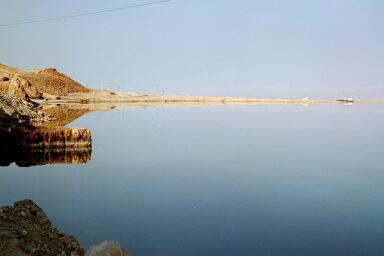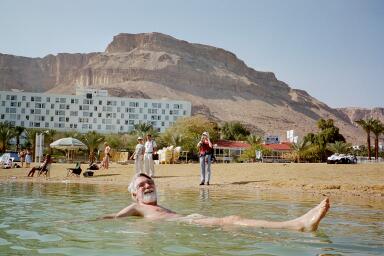Dead Sea - and the Importance of Giving
Reading: Luke 6.37-38
On our last day in Israel we travelled down to the Dead Sea Ė with a quick visit to En-Gedi and a visit to Masada on our way down and some time at Qumran (where the Dead Sea Scrolls were discovered) on our way back.
The Dead Sea is the lowest land depression in the world Ė around 400 metres below sea level. It is about 65 km long and is 18 km across at its widest point. The Sea of Galilee and the Jordan River are also below sea level. This is all part of what is called the Great Rift Valley which extends right down into Africa.
The Sea of Galilee and the Jordan River are fresh water and their heavy use for irrigation by Israel and Jordan have caused the level of the Dead Sea to drop by about a metre a year in recent times. So at the moment its shape isnít like the old maps. The smaller southern part of the Dead Sea is separated from the north, now connected only by a small canal.
 The Dead Sea is known in Hebrew as Yam HaMelah, Sea of Salt. It is around 30% salt Ė thatís nearly eight times the salt content of the ocean.That is too salty to sustain life and any fish unfortunate to be washed down the Jordan into it immediately die. Scientists have discovered eleven species of bacteria that manage to survive the environment. For all practical purposes, however, it is true to its name.
The Dead Sea is known in Hebrew as Yam HaMelah, Sea of Salt. It is around 30% salt Ė thatís nearly eight times the salt content of the ocean.That is too salty to sustain life and any fish unfortunate to be washed down the Jordan into it immediately die. Scientists have discovered eleven species of bacteria that manage to survive the environment. For all practical purposes, however, it is true to its name.
As you can imagine, both Israel and Jordan harvest minerals from the Dead Sea. The water of the Dead Sea contains twenty times as much bromine, fifteen times as much magnesium and ten times as much iodine as ordinary sea water. Health resorts have sprung up Ė and a whole industry to produce health and beauty products from the Dead Sea.
Bathing in the Dead Sea is a unique experience. It is important not to get the water in your eyes Ė or you will have difficulty opening them. So nobody tries to "swim" in the usual sense.
 Floating on your back is the way to do it. "Back in," our Israeli guide advised us. She did warn that people carrying too much weight can have a tendency to roll over. But she didnít tell us we would have difficulty getting vertical again and putting our feet on the bottom.
Floating on your back is the way to do it. "Back in," our Israeli guide advised us. She did warn that people carrying too much weight can have a tendency to roll over. But she didnít tell us we would have difficulty getting vertical again and putting our feet on the bottom.
Sets of showers up the beach enabled us to wash the salt off before we turned into potato crisps!
You may well have heard the comparison between the Sea of Galilee and the Dead Sea, but it bears repeating.
The Sea of Galilee receives water and gives out water. The water is fresh. It supports plenty of fish and is a good source of water for irrigation and urban needs. It is alive and life-giving.
On the other hand, the Dead Sea receives water but doesnít give. Its salt concentrations have long been so high that it cannot support life. It is aptly named the "Dead Sea."
In our reading, Jesus has given us an important principle for all of life. "Give and it will be given to you," he says. In case we donít get the message he adds, "A good measure, pressed down, shaken together and running over, will be poured into your lap" (Lk. 6.38).
Is that the principle on which most people base their lives? I suspect not. Some people seem intent on giving as little as they can get away with, but getting as much as they possibly can.
Someone has said that a person wrapped up in him- or herself makes a very small parcel. Thatís true, and the evidence of the basic focus of a personís life tends to be seen in its beauty or ugliness in old age.
Alison had a remarkable grand-mother who died at the age of 94. She married a widower with six children and went on to have ten more of her own. She was loved and respected by many people in both the church and the wider community.
At her eightieth birthday, one of her great-grandchildren came up to her and said, "Great-grandma, when I grow up, I want to be a nice old lady like you!" To which she replied, "Then youíd better begin practising, dearie!"
The prophet Jeremiah spoke this "word of the Lord", "My people have committed two sins: They have forsaken me, the spring of living water, and have dug their own cisterns, broken cisterns that cannot hold water" (Jer. 2.13).
Too often we donít want "living water" Ė which refreshes us and flows out to others also. We would rather a tank that is exclusively ours to dip into when we feel like it. But our "tanks" are broken and quite unable to contain and reserve the refreshment we want to keep to ourselves.
Godís living water is for us to receive and to pass on to others. The Sea of Galilee or the Dead Sea Ė which is it to be?
| PRAYER: Lord, we confess that too often we have wanted some kind of "canned spirituality" to carry around instead of coming continually to you, the spring of living water. And then we have tried to keep it all to ourselves. The gift has soured because we have refused to give it to others. Lord, make us able to receive and willing to give. In Jesusí name, Amen. |
Channels of God's Living Spring
Whoever
would want
a tank
if they had access
to a spring?
Yet
seeking to control,
to own,
to carry
our supply,
we wonder why
we feel
stale and dead
instead of
alive
and refreshed.
Open
to God
and to others,
let his spring
flow in
and through
and out
to others.
Be refreshed
and cleansed,
renewed
and renewing,
a channel
of Godís
living spring.
© Peter J. Blackburn, Burdekin Blue Care Devotions, 21 August
2001
More photos of Israel are available here.
Except where otherwise noted, Scripture quotations
are from the New International Version, © International
Bible Society, 1984.
Back to Sermons
 The Dead Sea is known in Hebrew as Yam HaMelah, Sea of Salt. It is around 30% salt Ė thatís nearly eight times the salt content of the ocean.That is too salty to sustain life and any fish unfortunate to be washed down the Jordan into it immediately die. Scientists have discovered eleven species of bacteria that manage to survive the environment. For all practical purposes, however, it is true to its name.
The Dead Sea is known in Hebrew as Yam HaMelah, Sea of Salt. It is around 30% salt Ė thatís nearly eight times the salt content of the ocean.That is too salty to sustain life and any fish unfortunate to be washed down the Jordan into it immediately die. Scientists have discovered eleven species of bacteria that manage to survive the environment. For all practical purposes, however, it is true to its name. Floating on your back is the way to do it. "Back in," our Israeli guide advised us. She did warn that people carrying too much weight can have a tendency to roll over. But she didnít tell us we would have difficulty getting vertical again and putting our feet on the bottom.
Floating on your back is the way to do it. "Back in," our Israeli guide advised us. She did warn that people carrying too much weight can have a tendency to roll over. But she didnít tell us we would have difficulty getting vertical again and putting our feet on the bottom.